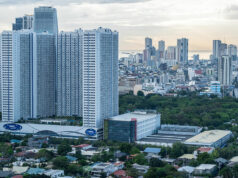Metro mayors seek general lockdown until end-December
By Vann Marlo M. Villegas
and Charmaine A. Tadalan
METRO Manila’s 17 mayors want the government to keep the region under a general lockdown until year-end to prevent a fresh surge in coronavirus infections.
“There’s a need to contain the virus,” Parañaque City Mayor Edwin L. Olivarez, who heads the Metro Manila Council, told an online news briefing on Thursday.
He said the mayors agreed at their last meeting to keep the existing quarantine and prevent rising cases in the capital region.
Mr. Olivarez told ABS-CBN Teleradyo the council made the recommendation to an inter-agency task force made up of Cabinet secretaries before new lockdown levels were announced for November.
President Rodrigo R. Duterte on Tuesday said Metro Manila would remain under a general lockdown next month, along with Batangas, Iloilo City, Bacolod City, Tacloban City and Iligan City. Lanao del Sur in southern Philippines was also placed under a general lockdown from a strict quarantine.
The President locked down the entire Luzon island in mid-March, suspending work, classes and transportation to contain the pandemic. People should stay home except to buy food and other basic goods, he said.
The lockdown in most parts of the country has since been eased even if public transportation remains limited.
There were 184,275 coronavirus cases in Metro Manila as of Oct. 28. The death toll was at 3,301, while 168,947 patients have recovered, according to the Health department’s COVID-19 tracker website. The capital region had 12,027 active cases.
The Department of Health (DoH) reported 1,761 coronavirus infections on Thursday, bringing the total to 376,935.
The death toll rose by 33 to 7,147, while recoveries increased by 740 to 329,848, it said in a bulletin.
There were 39,940 active cases, 83.3% of which were mild, 10.9% did not show symptoms, 3.7% were critical and 2.1% severe.
Quezon City reported the highest number of new cases at 85, followed by Rizal at 74, Caloocan City at 73, Davao City at 70 and Laguna at 69. DoH said nine out of 140 laboratories had failed to submit their case data.
More than 4.4 million people have been tested for the coronavirus as of Oct. 27, according to the agency’s COVID-19 tracker website.
The coronavirus has infected 44.8 million and killed over 1.2 million people worldwide, according to the Worldometers website, citing various sources including data from the World Health Organization (WHO).
PATENTS
Also on Thursday, Senator Risa N. Hontiveros-Baraquel filed a resolution asking the Executive branch to order the Department of Foreign Affairs to support the proposal to suspend implementation of certain provisions on intellectual property rights. This would ensure access to coronavirus vaccines once they become available, she said.
“There is a valid concern that intellectual property rights, especially patents, make current medicines and medical devices out of reach for most people and will eventually also put vaccines out of reach, especially of poor people,” according to a copy of the resolution.
This comes as India and South Africa asked the World Trade Organization to waive provisions under the Agreement on Trade-Related Aspects of Intellectual Property Rights (TRIPS), in light of the coronavirus pandemic.
Ms. Hontiveros-Baraquel said the vaccine for COVID-19 should be considered a “global public good” and should be exempted from patents and copyrights.
“The COVID-19 vaccine should not be treated as a product to be sold to the highest bidder,” she said in a separate statement. “Billions of lives are at stake here.”
“Only universal access to COVID-19 vaccine will save the global community from illness and economic paralysis. Only a global solution will allow us to collectively come out of the darkness,” she added.
WTO-member states this month discussed a proposal to waive provisions on copyright, patents and protection of undisclosed information, according to an Oct. 20 article published on its website.
The TRIPS Council had yet to finish discussions on the proposal and would reconvene before Dec. 31. “Given this range of positions, the Council chair, Ambassador Xolelwa Mlumbi-Peter of South Africa, said that the item would remain suspended as members continue to consider the proposal,” the WTO said.
Meanwhile, a Social Weather Stations Poll (SWS) found that Filipinos have mixed opinions about the accuracy of the government’s COVID-19 tally.
In a statement, SWS said 39% of Filipinos think the reported infections were probably overreported, 31% said the cases were underreported and 23% said the cases were probably right.
“There is also no consensus on the accuracy of the number of COVID-19 deaths being reported by the government,” it added.
About 34% said the deaths were probably underreported, another 34% said these were overreported and 27% said the reports were probably right.
Only 14% of Filipinos in Metro Manila thought the reported cases were accurate, compared with 31% in Mindanao, 24% in the Visayas and 23% in the rest of Luzon, SWS said.
Meanwhile, only a fifth of Filipinos in the capital region thought the reported deaths were accurate, compared with 29% in both Mindanao and the Visayas, and 26% for the rest of Luzon.
Educated groups saw the reported cases as less accurate, with only 18% of college graduates saying the positive cases were probably right, compared with 22% among junior high school graduates, 26% among non-elementary graduates and 31% among elementary graduates.
Opinions were also mixed across education groups about the death toll.
SWS interviewed 1,249 adults from Sept. 17 to 20 via mobile and computer-assisted phone for the poll, which had an error margin of ±3%.



